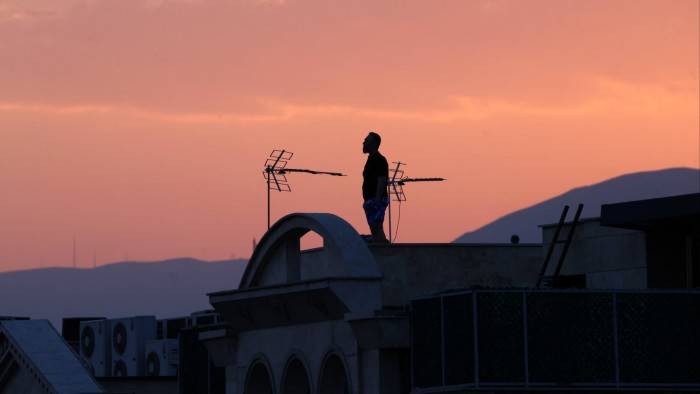Israel’s bombing of Iran came so close to the home of Mahin, 80, that a massive explosion filled the air with smoke in her affluent neighbourhood of Tehran.
Yet Mahin has remained among the millions of residents of the Iranian capital refusing to evacuate.
“Where shall I go? I feel more comfortable at home,” she said.
The blast shook her so badly that she felt “like [her] whole digestive system was coming out of [her] mouth” — yet even then, she said, “I don’t really want to pack and unpack and buy food somewhere else. Someone should stay, protect the home and water the garden.”
Roads out of Tehran have been choked with people trying to flee since the first strikes on Friday. New waves of departures were triggered by Israel ordering an evacuation of one district and US President Donald Trump on Monday urging ‘‘everyone’’ to immediately leave Tehran. While the US is not involved militarily, Trump is weighing whether to join.
There is no official data on how many people have left the city of 10mn, which has been a focus for Israeli strikes. The war has slowed the usual hectic pace of the city, reducing it to a quiet that resembles New Year holidays, but grocery stores, bakeries, banks, medical centres and petrol stations remain open.
Israel’s strikes have killed or injured nearly 1,500 people in Iran, according to the health ministry. Many are staying put or fleeing to makeshift bomb shelters to seek cover.
Others have grown so accustomed to the attacks that they watch from rooftops each night, guessing what locations have been hit.
“As soon as there is any explosion, our neighbours go to windows and rooftops as if they are watching fireworks,” said a resident of a middle-class neighbourhood in western Tehran.

Workers in banks, hospitals, and police and military stations have been ordered to remain in the city. Other residents have chosen to stay, insisting they will not leave under any circumstances.
“I’m no fan of the Islamic republic, but it’s now time to show solidarity for Iran,” said Shirin, a private sector employee. “Trump and Netanyahu say ‘evacuate’ as if they care about our health. How can a city of 10mn evacuate? My husband and I are not going to pave the ground for them. Let them kill us.”
For some, the chaos on the roads feels more daunting than the threat of Israeli attacks. Petrol stations are overwhelmed, with long queues and fuel rationing. Reports from safer areas describe disrupted food supplies, further discouraging evacuation.
There is also growing anger at Israel and Trump, whose warnings of escalating violence have frightened some and strengthened others’ resolve to rally around the Iranian flag.
“I will stay in Tehran. It’s Iran’s heart,” wrote journalist Farid Modarresi on X. “The project to evacuate Tehran is very dangerous.” He suggested it could even pave the way for “a very complicated, hybrid operation to occupy land”.
Online, a wave of solidarity is emerging. Many are posting to reassure others that they remain in Tehran. “We are in Tehran and are happy to help,” wrote one local psychology centre.
Israel’s strikes targeting senior commanders risk a high civilian toll, as ordinary people in Tehran often live alongside senior officials, politicians or military personnel. Entire buildings and neighbourhoods have been caught up in the damage.
Although the government has developed affordable housing for state employees, many rent out or sell those homes and live among the general population, drawn by better living conditions or a more central location. This blending of civilian and official life increases the risk to ordinary people.
A similar pattern has been seen in Lebanon, where Israeli strikes on Iranian-backed Hizbollah leaders also claimed civilian lives.
Iran’s health minister has appealed to international organisations to intervene. Mohammad-Reza Zafarghandi wrote on Tuesday that 1,481 people, mostly women and children, had been injured or killed since Friday, warning that attacks on nuclear facilities could release radiation across the region.
While attacks on nuclear facilities pose evident safety risks, Israel’s strikes appear to have avoided the most dangerous targets. The assault on the Natanz uranium enrichment facility has caused localised radioactivity within the complex, Iranian and international nuclear authorities have said, but it does not appear to be severe.
Those who have left the city are now urging their loved ones to follow. Families are divided. With internet access slowed to restrict the flow of information, distance and anxiety continue to grow.

The Islamic republic is not invoking loyalty to its ideology of political Islam to hold the nation together. Instead, it is appealing to nationalist sentiment.
In central Vanak Square, Tehran’s hardline municipality has erected a massive banner of Arash the Archer, a legendary Persian hero and symbol of ultimate sacrifice. He is now being used to invoke pride and unity in the face of a foreign threat.
Iran’s supreme leader Ayatollah Ali Khamenei on Wednesday praised “the calm, courageous and timely behaviour of the Iranian nation in the recent issue of the foolish and malicious aggression by the Zionist enemy” and said it was “a sign of the nation’s growth and the strengthening of rationality and spirituality’’.
Still, with the US considering joining Israeli military action, many fear for the country’s future amid mounting casualties and destruction.
Trump “may decide he needs to take further action” to prevent Tehran from enriching uranium, US vice-president JD Vance said on Tuesday — just before the president called for Iran’s “unconditional surrender”.
There is no indication that the Islamic republic plans to comply. The evacuation campaign is widely viewed by Iranian politicians as part of a psychological warfare strategy, intended to intensify pressure on Iran to capitulate.
“I want Tehran more than any time before in my life,” posted a housewife on Instagram, expressing frustration with those who fled and accusing them of giving the enemy exactly what it wants. “When a forest is on fire, only animals flee. Trees have their roots in the land.”




